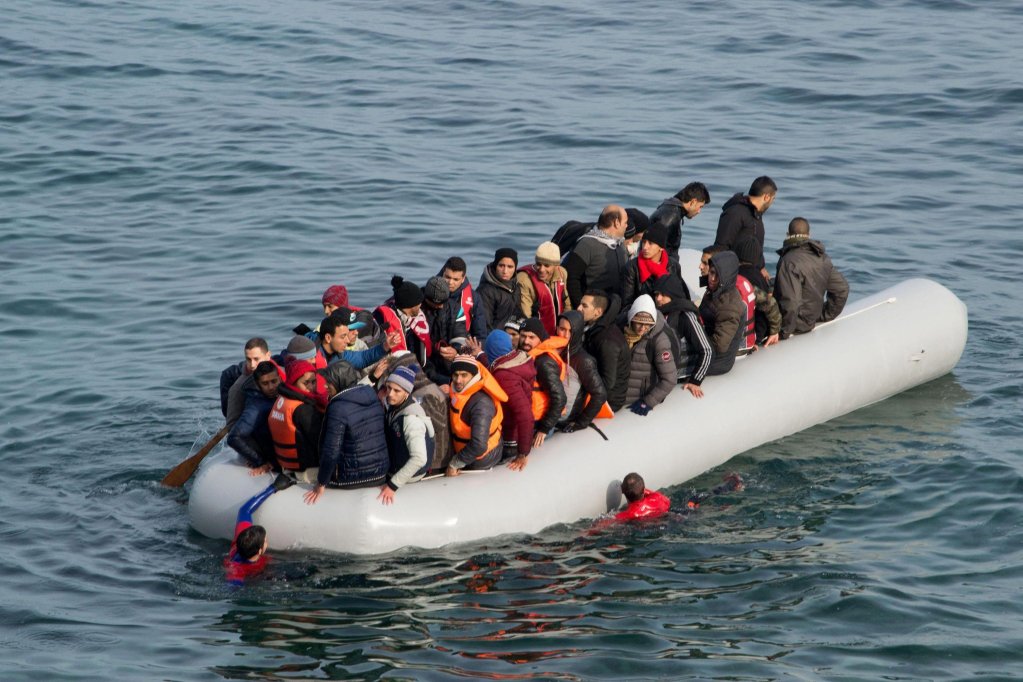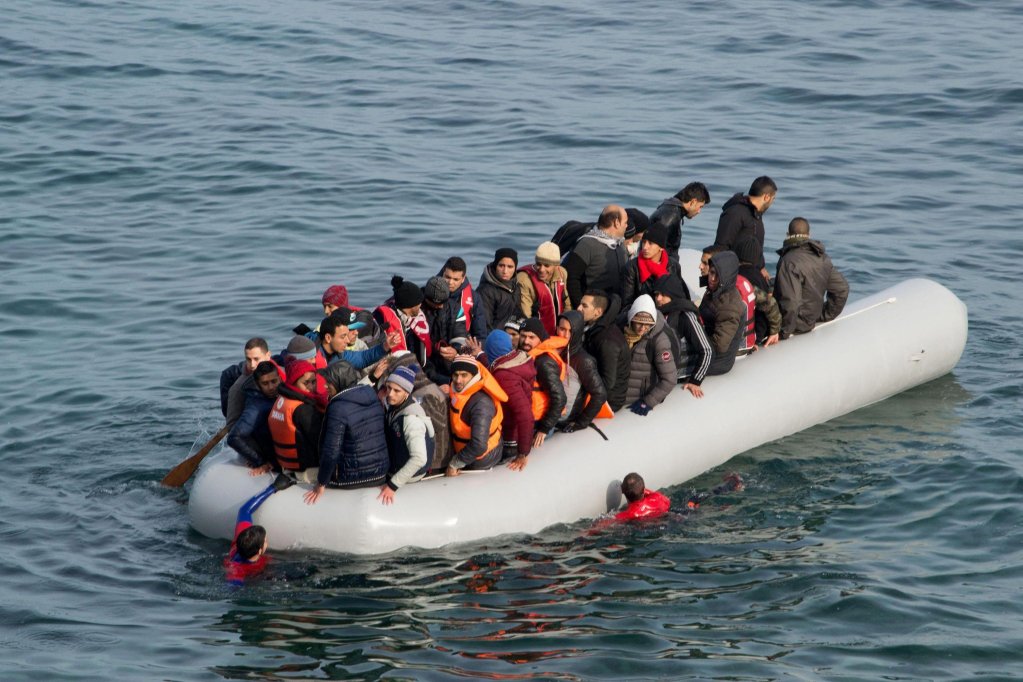Address
304 North Cardinal St.
Dorchester Center, MA 02124
Work Hours
Monday to Friday: 7AM - 7PM
Weekend: 10AM - 5PM
Address
304 North Cardinal St.
Dorchester Center, MA 02124
Work Hours
Monday to Friday: 7AM - 7PM
Weekend: 10AM - 5PM


Credit: EPA/STRINGER
On 9 August 2023, the United Kingdom and Turkey issued a joint statement, underlining “their commitment to work in the field of migration.” The parties announced the establishment of “the Centre of Excellence” by the Turkish police force which, the statement indicated, aimed to “enrich existing expertise with respect to activities aimed at disrupting criminal networks organizing illegal journeys.” Both countries also reiterated their desire to combat illegal migration within international and multilateral frameworks.
One important feature of the agreement, which British Home Secretary Suelle Braverman mentioned while announcing the deal, was the fact that British and Turkish security forces would work together to control the supply of small boats that are used to make illegal crossings across the English Channel.
Meanwhile, the deal did not include any clauses about the Turkish asylum seekers despite the fact that, according to the Home Office figures, 1,486 Turkish nationals have crossed the Channel by boat in the first seven months of 2023, the second highest figure behind Afghans. As a result of the U.K leaving the European Union in 2020, Turkey and Britain do not have a formal returns agreement, even though the two countries are expected to hold a UK-Turkey Migration dialogue meeting later this year, where they hope to finalize a bilateral deal to tackle illegal immigration.
Rishi Sunak’s Government Under Pressure
Migration continues to be a major political and social issue for both the U.K and Turkey. In London, Rishi Sunak’s government has recently been under pressure, especially from the conservative voter base and political elite, to curb the migration figures. On the one hand, the number of people crossing the English Channel illegally by small boats has reached more than 100,000 since 2018. On the other hand, in 2022 alone, net migration to the U.K has gone up to its highest level on record, with the precise figure being 606,000.
Reducing the level of net migration was a key issue of the Leave campaign in the Brexit vote, with the Leave supporters arguing that exiting the EU would enable the U.K to “take back control” over immigration policy. The latest data, however, show that this promise failed to materialize. Not only migration figures did not fall since Brexit, but there is actually an uptrend in the numbers since Brexit came into effect in 2020. As a result, the Sunak administration has recently adopted a number of harsher measures, especially to demonstrate their tough stance on illegal migration. Early in 2023, for instance, Sunak has made a commitment to “stop the boats,” crossing the Channel to curb illegal immigration into the country. Following up on his promise, Sunak has claimed on 5 June that the crossings were down 20 percent since he launched his campaign, underlining the effectiveness of his government’s policies.
With the elections looming in 2024 and the country going through a tough cost of living crisis – inflation in July 2023 was 6.8% – critics expect the Sunak government to drum up the issue of migration and make it a priority for voters. In this sense, the deal that the Sunak government has recently concluded with Turkey and future efforts to work closely with the Turkish government to return any illegal immigrants back to Turkey, can be read through this lens. It is doubtful, however, that this strategy would provide the benefits that the Tories expect from it. A poll conducted in 2022 has demonstrated that only 9% of the British voters currently citing immigration as a top priority, down from 44% in 2015, ahead of the Brexit vote.
Anti-Immigrant Feeling on the Rise in Turkey
In Turkey, too, migrants are a source of political and social tension, with anti-immigrant sentiment being on the rise. According to the latest figures, Turkey currently hosts around four million refugees, with 3.6 million Syrians constituting the most populous group. In March 2016, Turkey and EU have signed a deal which stipulated the return of anyone who arrived on Greek islands illegally to be returned to Turkey and kept there. In exchange, Turkey was to receive 6 billion euros to improve the humanitarian conditions of the refugees in Turkey. Moreover, the EU has made the vague promise of speeding up the visa liberalization process if the Turkish side complied with several requirements, which led nowhere.
The presence of more than 4 million immigrants in Turkey has been a major issue in the presidential elections held in May 2023, especially in the second round. Trailing behind President Recep Tayyip Erdoğan at the end of the first round on 14 May, the opposition candidate Kemal Kılıçdaroğlu made a sharp turn towards anti-migrant rhetoric, promising to send all refugees back in a year. In a similar vein, Kılıçdaroğlu also made a deal with Ümit Özdağ, the leader of the far-right Victory Party and a champion of anti-immigrant ideas, in his efforts to secure a lead in the second round. Meanwhile, Erdoğan continued to portray himself as a protector of the refugees in the election campaign, especially from a religious perspective, even though his voters have also occasionally voiced their opinions against them.
Kılıçdaroğlu’s bet did not pay off and Erdoğan secured another term at the office until 2028. The anti-immigration feeling in the country, however, did not subside. In fact, the deteriorating economic conditions after Erdoğan’s election victory have created an environment ripe for anti-immigrant feeling, spilling over to racism, to flourish. Since Erdoğan’s victory on 28 May, for instance, the Turkish lira lost almost 30% of its value against the U.S dollar, while the official inflation rate in July 2023 was close to 50%, with the unofficial rate being much higher. The new Minister of Finance, Mehmet Şimşek, also raised indirect taxes a considerable degree, which pushed the prices higher and put an even heavier burden on the already struggling Turkish consumers.
With this slow and prolonged economic disaster as the background, it is not surprising to observe that anti-immigrant feeling, already strong to begin with, has recently been approaching a boiling point across the whole political spectrum. Kaya Genç has recently written about how even staunch opponents of Erdoğan, who would describe themselves as democrats, easily slipped into anti-immigrant rhetoric, vehemently arguing that “Arabs” are “invading” Turkey. The popular online forum Ekşi Sözlük is also full of comments in this vein. Most recently, a rumor about a Syrian man sexually abusing a child in Sanliurfa led to people protesting in the streets and smashing the windows of a number of shops owned by Syrians. In short, as Genç puts it, the immigrants in Turkey are seen as an “underclass” and seen as culprits for the economic and social woes that the country continues to struggle through.
Seen through this lens, the deal that the Erdoğan government has made with the U.K will certainly be unpopular since it would be blamed as another reason for the increase of the number of refugees in the country. Tellingly, the details of the deal have generally been glossed over in the pro-government media. Even though Erdoğan has secured a new 5-year term, he would still need to pay attention not to alienate his voter base in this issue because the local elections are coming up and Erdoğan would want to take back Istanbul, where a considerable number of Syrian refugees live, from the opposition.
The issue of migration will continue to shape Turkey’s political scene over the long term, too. With the established opposition in ruins after the election defeat and not able to give any hope to the voter base for the future, ultra-nationalist/far-right political movements with racist and anti-immigrant agendas may become more dominant and play more important roles in Turkish politics over the long run. The deal between Kılıçdaroğlu and Özdag before the second round of the 2023 presidential elections can be seen as a preview of this process. If realized, this further move to the right would be the harbinger of worse days to come.